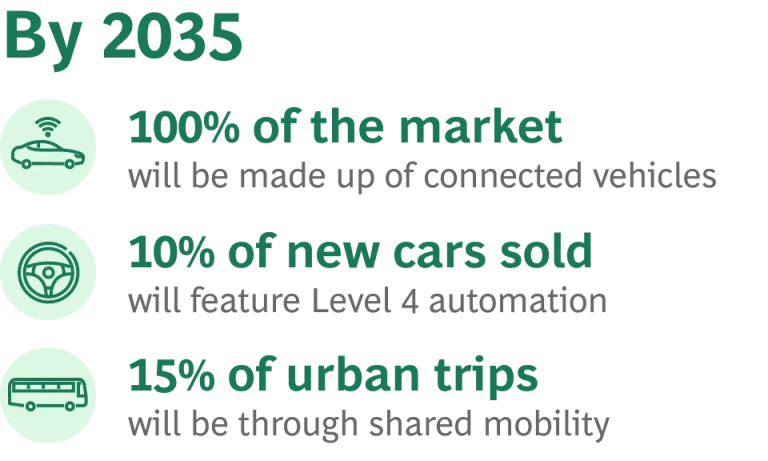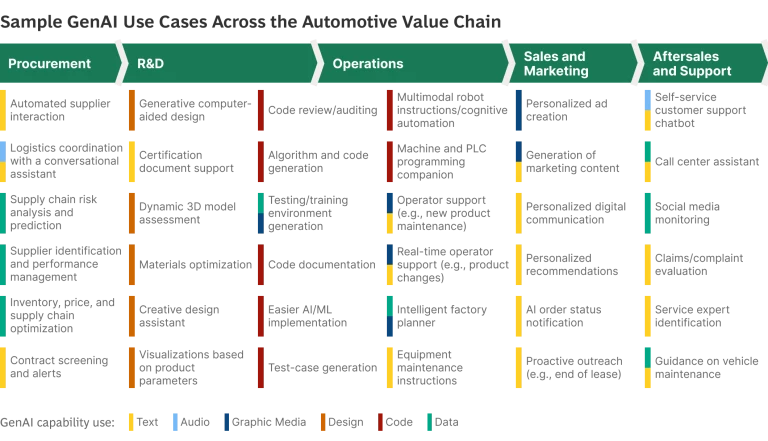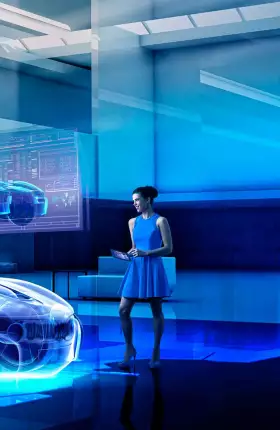Chances are, you’ve already used AI as a transportation solution. From ride-sharing apps to driver assistance systems like lane departure warnings and automatic parking, artificial intelligence has been helping us move safely from point A to point B—and everywhere in between—for years.

Now, with generative AI, the automotive industry and the broader field of mobility are undergoing a transformative shift. Advancements in AI and GenAI are not only redefining vehicle manufacturing and design—they’re personalizing the customer journey, reducing supply-chain costs, and reshaping the concept of urban transportation in general.
We might still be a few years away from fully autonomous vehicles. But implemented safely and responsibly, AI and GenAI can help build a new era of efficient, sustainable, accessibile, and user-centric mobility solutions.
Transforming the Auto Industry
Generative AI’s impact on the automotive industry will be nothing short of revolutionary. It’s already happening, in fact: BCG experts have identified over 70 GenAI use cases across different aspects of the automotive value chain, including procurement, R&D, manufacturing, sales, marketing, and aftersales service.

GenAI can assist in creating computer-aided designs (CADs) and selecting optimal materials—leading to more efficient and customer-centric vehicle designs. GenAI also accelerates the development of the sophisticated software required in modern vehicles—though it will still require human oversight, of course.
In manufacturing, GenAI can increase the efficiency of hands-on tasks like programming or maintaining machines—for example, generating code or code blocks from text inputs. Recommendation tools can help workers identify the best methods for tasks; GenAI also can enhance predictive maintenance by automatically generating instructions and lists of required spare parts. And emerging solutions will enable machinery to self-regulate and adapt to new environments.
GenAI can also optimize procurement processes, improve supply chain logistics and risk analysis, and enhance operations with applications like code review, testing environment generation, and machine programming. And lest we forget, AI is the cornerstone of autonomous vehicle technology—from processing real-time data to making split-second decisions, AI systems ensure the safety and efficiency of self-driving vehicles.

Remaking the Customer Experience
Amid radical changes in vehicle designs, powertrains, connected software, and other technologies, one aspect of the automotive industry remains stuck in the past, at least relatively speaking: buying a car. For most consumers, it’s still a stressful, burdensome experience.
Generative AI, along with virtual reality (VR) and augmented reality (AR), can change that.
Online environments powered by these technologies can enable OEMs to revolutionize automotive marketing through hyperpersonalization, making the car-buying experience more convenient and less time-consuming.
With AR and VR, automakers can create digital showrooms—immersive “living room pop-up stores” where customers can explore different vehicle configurations and take virtual test drives. AI-enabled chatbots can assist customers in choosing the right model, making suggestions based on the customer’s profile and providing information on pricing and financing options. Once a sale is made, GenAI can help provide effective customer support, leveraging AI assistants and chatbots for better customer experiences.
Adopting these technologies not only reduces the cost base related to traditional sales models, which involve physical showrooms and extensive dealer networks. It also improves customer satisfaction—enhancing the car-buying experience while increasing customer engagement and loyalty, triggering repeat purchases, and generating word-of-mouth referrals.
Driving Efficient, Sustainable Mobility
AI's influence on transportation and mobility extends well beyond automobiles. It plays a critical role in optimizing public transportation systems, enhancing passenger safety, and reducing operational costs. Smart-city integration of AI technologies will be key to managing traffic flows, reducing congestion, and effectively planning urban transportation networks.
And by enabling mobility as a service, AI can underpin a comprehensive digital platform that maps out all mobility options for users, including traditional modes like buses and trains as well as innovative solutions such as ride pooling, e-bikes, and free-floating scooters. This system would allow users to effortlessly compare, reserve, and pay for transportation services—reducing congestion through the promotion of electric and pooled options and broadening access for those who don’t own a vehicle.
Sustainability is a key concern of any mobility solution, of course, and AI can play a pivotal role there as well. AI is instrumental in developing ecofriendly transportation solutions, including AI-driven electric vehicles that not only reduce carbon emissions but also feature efficient battery management and charging infrastructure.
AI can also help make auto manufacturing processes more sustainable by reducing waste and optimizing resource utilization. And it can also help improve the sustainability of air, sea, and rail transport while also optimizing logistics, predictive maintenance, and operational management.
Overcoming the Obstacles
As with any industry, implementing AI and GenAI systems present companies in the automotive and transportation sectors with a number of challenges. Among them:
Safety and Privacy Concerns. AI systems carry a risk of being manipulated or malfunctioning, which could lead to unsafe vehicle behaviors. Additionally, the extensive data collection necessary for AI systems could compromise user privacy if not properly secured against unauthorized access or breaches. To mitigate these risks, OEMs must ensure robust security measures and ethical data handling practices.
Increasing Complexity. GenAI require extremely precise foundational models; these models, while powerful, need quality assessment to ensure accuracy and practicality. There is also the separate but related challenge of merging AI technologies with existing transport infrastructure, which requires significant strategic planning and investment. Companies will also need to navigate potential regulatory restrictions on the use of AI and GenAI.
Impact on Workforce and Processes. GenAI will transform job profiles and skillsets in the automotive industry, which in turn will require companies to shift their recruiting strategies and operating models. Workers will need to be upskilled in areas such as data and analytics, artificial intelligence, and systems thinking; automakers will also need to recruit the best AI talent.
Embedding advanced technologies like GenAI, AI, and machine learning will require significant shifts in companies’ operating models and organizational culture, as well as a strong commitment to safety. But if implemented responsibly, AI can enable a major leap toward more efficient, sustainable, and user-centric mobility.










